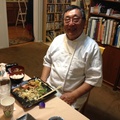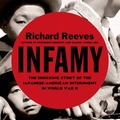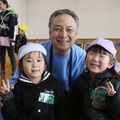Over 35 years ago, solo performance artist Dan Kwong remembers the moment martial arts legend Bruce Lee entered his life, and changed him forever.
It was 1972 at the historic Biograph movie theater in Chicago. Bruce Lee’s “Fist of Fury” was on the big screen and Kwong, a 20-something Asian American male who grew up in the 1960s with no Asian male heroes to call his own, sat there with his eyes popped out and his mouth wide open. When Bruce Lee entered and threw his first punch, Kwong’s world, at that moment, was turned upside down.
“He was magnificent!” said Kwong.
So magnificent that when Bruce Lee proceeded to punch and whirl and kick and take out all these bad guys all by himself, and just stood there, as Kwong remembers, “With this wild look on his face, like he’s gonna explode from the inside,” the audience, made up of mostly young, white males, started to cheer.
And Kwong sat there, crowd going bananas, Bruce Lee blazing hot on screen, and he started to cry.
Thirty six years later, Kwong, now 53, writes about this moment in his first play entitled “Be Like Water,” which will have its world premiere on September 17 at the East West Players David Henry Hwang Theater in Little Tokyo, downtown Los Angeles.
“If you were an Asian guy,” says Frank Fong, the Asian American father character in the play, “There was nothing out there to look up to. Nothing! Until Bruce Lee. It was like growing up in a dry, empty desert. Then one day you walk over a hill—and there’s the Pacific Ocean. That was Bruce. He was the ocean.”
Kwong, the playwright, added: “Bruce Lee was international. He was global. He went beyond only a single group of people. But he did have a very specific impact for a specific group of people, which is guys like me, and I wanted to shine a light on that.”
So with Bruce Lee as his inspiration, Kwong added in a mother/daughter conflict, disco dancing teens, Gung Fu fighting and the ghost of Bruce Lee presiding over the entire proceedings while appearing in various forms of water—and a full-length play was born.
Presented in association with Cedar Grove Onstage and directed by Academy Award winner Chris Tashima, “Be Like Water” is set in Chicago, 1978, where we meet 13-year-old Tracy Fong, a Gung Fu fanatic tomboy who is challenged by school bullies, airhead rivals and a controlling mother who just wants her to be a “normal” girl.
Throughout the play, as Tracy’s life spins out of control, the ghost of Bruce Lee appears on stage to teach Tracy the true meaning of strength and the power of water.
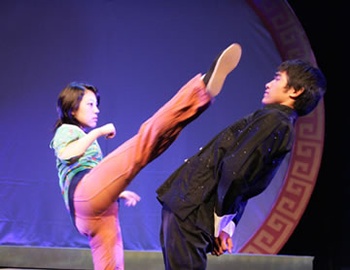
Tracy (Saya Tomioka), Ghost of Bruce Lee (Cesar Cipriano). Ghost of Bruce Lee continues to train Tracy in Jeet Kune Do.
“There’s two inspirations for this story,” said Kwong. “One, I wanted to express some things I believe about family and relationships and what happens to people who don’t fit in. The other main inspiration was I wanted to say something about the very specific impact Bruce Lee had for Asian American men.”
Some might suggest that these are two separate plays. Kwong disagrees.
“It turns out Bruce Lee had a lot to say about family and a lot to say about relationships. He was just as much a philosopher as he was the greatest martial artist of his time. So to combine these two ideas was actually very natural.”
Tashima, the play’s director, agrees.
“It’s really a show about Asian American identity and family,” said Tashima, who himself grew up inspired by Bruce Lee. “But Dan is using one of our most recognizable heroes in Bruce Lee, and he brings him back as a ghost who helps a young girl who’s going through family issues. It’s a really interesting idea,” said Tashima.
As the show’s director, Tashima knows he has a lot of theatrical elements to play with, but has been focusing most of his energy on the mother/daughter relationship.
“That’s the human story,” said Tashima. “We’ve been spending a lot of time in rehearsal making sure that this relationship rings true.”
Kwong knows that many will be able to relate to the 13-year-old daughter rebelling against the high expectations of her mother, especially those that grew up in traditional Asian or Asian American households.
“Growing up with a relentlessly demanding, critical parent is pretty common in our cultural tradition,” said Kwong, who is of Chinese and Japanese ancestry. “It’s part of what has made our community successful and functioning in society. But that comes at a cost.”
Asian Americans, growing up in this “pressure cooker” environment, often lose their sense of self acceptance and mutual acceptance, according to Kwong. “That becomes very elusive because nothing is ever good enough. We cannot accept ourselves and we cannot accept each other,” he said.
So in the play, we see what happens to 13-year-old Tracy as she nears her boiling point.
“She gets it from her mom. She gets it from the school bully, Jeremy—this racism, sexism and homophobia. It’s very raw and ugly,” said Kwong.
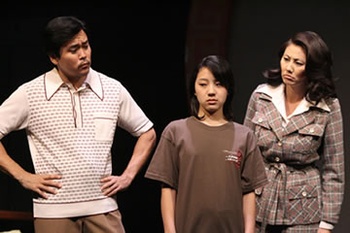
Frank (Michael Sun Lee), Tracy (Saya Tomioka), Kimiko (Pam Hayashida). Parents Frank & Kimiko confront Tracy after she gets into trouble.
Since 1989, Kwong has been best known to local audiences for his autobiographical solo performance pieces such as “Secrets of a Samurai Centerfielder,” “Tales From the Fractured Tao,” “The Dodo Vaccine,” and his latest work, “It’s Great 2B American.”
As a solo performer, he has written, acted and directed his own works, created his own props, built his own costumes, designed and constructed his own sets and hung his own lights at Highways Performance Space in Santa Monica and at venues across the country and around the world.
“As a soloist, I can write something and immediately bring it to life,” said Kwong. “But with a multi-character piece, it takes longer and it’s more complicated to do.”
But it’s an experience he’s learning from and enjoying.
“To see the characters and scenes actually coming to life on stage has been incredibly exciting. And having this creative team of expert specialists—from dance and fight choreographers, to costumes, to props, to lighting and set design…that’s been a real treat to have these incredibly talented specialists contributing to the vision.”
“And it’s been a real pleasure to watch Chris working with the actors,” said Kwong. “The way he supports them and encourages their creativity in finding the truth in each scene and in each moment. And it’s been really delightful to work with these teenage actors. They’re energy is refreshing and reminds me of a certain kind of innocence.”
And when this innocence gets threatened in his play by a bigoted bully, enter Bruce Lee, Kwong’s superhero, who guides and comforts Tracy with his words and philosophy instead of with punches and kicks.
“He’s the helping hand we all wish we had in our time of need growing up,” said Kwong. And in the end, says Kwong, Tracy learns that the act of opening her heart—something she had once considered a weakness—actually makes her stronger.
As for his overall message, Kwong wants people to see the “preciousness of family. Sometimes the obstacles that look so overwhelming between people are not as permanent or formidable as you think they are. And that Bruce Lee was something special.”
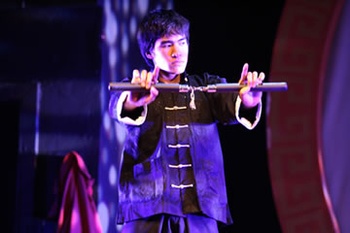
Ghost of Bruce Lee (Cesar Cipriano). The Ghost of Bruce Lee continues to refine his martial arts skills, even in death.
* * *
“Be Like Water” will have its world premiere on Wednesday, September 17 at the East West Players David Henry Hwang Theater at the Union Center for the Arts, 120 Judge John Aiso Street in downtown Los Angeles. The show runs from September 18 to October 12, Wednesdays through Saturdays at 8 p.m., Sundays at 2 p.m. Tickets are $35 Orchestra, $30 Balcony. Preview performances are September 11-14, $20 all seats, $12 w/valid student I.D. For tickets and information, call the East West Players at 213/625-7000 or purchase tickets online at EastWestPlayers.org.
* All photos by Michael Lamont courtesy of East West Players.
© 2008 Soji Kashiwagi


